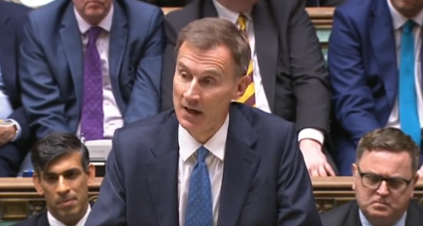Charities have raised concerns about benefits sanctions announced in Chancellor Jeremy Hunt’s Autumn Statement, which they fear will put pressure on people with disabilities and long term health conditions to find work.
His budget statement said the government plans “strengthening sanctions for those who choose not to engage with measures that help them find work”.
He adds this will “further enforce the government’s expectation that those who can work must engage with the support available or lose their benefits”.
Hunt said that currently there are “a record 2.6 million people who are economically inactive due to long-term sickness and disability, almost half a million more than before the pandemic” adding the government will “reform the fit note process to support more people to resume work after a period of illness”.
The Chancellor also said he will increase benefits by 6.7% next year, which is equivalent to inflation in the year up to September 2023.
But Sense said that Hunt has “given with one hand and taken away with the other” by uprating benefits in line with inflation but “then piling pressure on disabled people to ‘get back to work’”.
As expected, the government’s #AutumnStatement has given with one hand and taken away with the other.
— Sense (@sensecharity) November 22, 2023
Uprating #Benefits in line with inflation and then piling pressure onto disabled people to "get back to work". (1/6) https://t.co/jmasME040q
Scope is also concerned about tougher sanctions for those who unable to work due to disability or illness.
The charity is particularly concerned by comments made shortly ahead of the Autumn Statement by chief secretary to the treasury Laura Trott that disabled people must do “their duty” to find employment, even if it means working from home.
Scope said Trott’s comments are “absurd” adding “it’s completely irresponsible to suggest that people who are unwell have a duty to work through it”.
“Comments like this fuel a dangerous narrative. One that demonises disabled people, and paints them as burdens on the taxpayer,” said the charity.
It added: “The suggestion that disabled people can simply work from home is totally impractical too.”
Meanwhile, RNIB said that “harsh benefit sanctions are unjust, unnecessary and do not work” adding that “many people with sight loss want to work but face huge obstacles”.
It is calling on the government to instead invest in “high quality, tailored employment support for blind and partially sighted people”.
The announcement of new UK Government plans to tighten health-related benefits has caused alarm among blind and partially sighted people.
— RNIB (@RNIB) November 22, 2023
Disabled people make an incredibly valuable contribution to society, but work isn’t possible in all circumstances.#AutumnStatement pic.twitter.com/30I8TtEcAY
Tackling antisemitism
Elsewhere in his autumn statement Hunt pledged to continue giving additional funding to the charity Community Security Trust, which provides security to Jewish communities at schools and synagogues amid a spike in antisemitic incidents amid the conflict in Israel and Gaza.
In October it gave the charity an additional £3m to safeguard communities on top of its £15m government grant. https://www.charitytimes.com/ct/Government-hands-Jewish-charity-3m-amid-spike-in-antisemitic-incidents.php
Hunt says this uplift will be maintained in 2024/25.
In addition, it is to provide £7m over three years for organisations including the Holocaust Educational Trust to help tackle antisemitism in schools and universities.
Antisemitism is at an all time high. We will work with Government and partners to ensure generations recognise and stand up against anti-Jewish hatred today and always. Thank you for this support.@Jeremy_Hunt @hmtreasury @CST_UK @UJS_UK pic.twitter.com/0jXrkYjn1j
— H.E.T. (@HolocaustUK) November 22, 2023
Support for veterans
Also announced is an additional £10m to support the Veterans’ Places, People and Pathways Programme, which hands out grants to charities to support veterans.
This is funded through the Veterans’ Mental Health and Wellbeing Fund and awards grants to specialist charities in supporting the needs of veterans.













Recent Stories